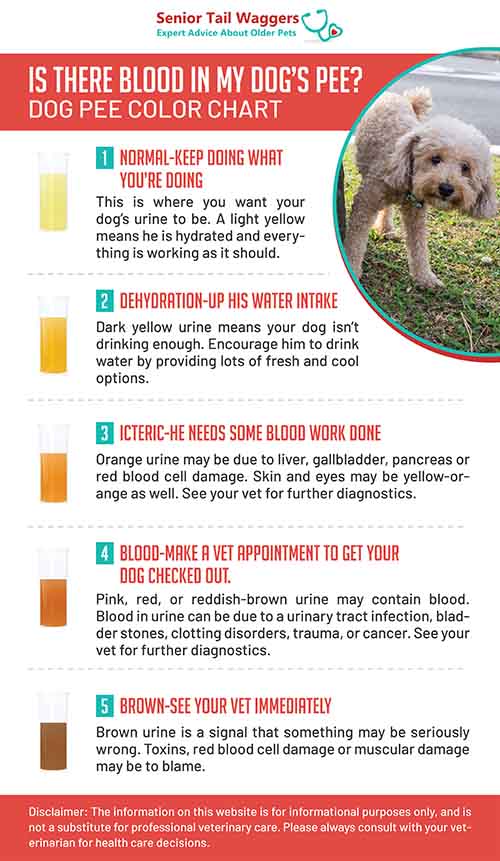
This article was updated on June 27th, 2023
The sight of blood in your dog’s urine can be extremely scary and make any pet owner feel concerned. But before you panic, it’s important to remember that there are lots of different causes for blood in the urine (hematuria) and many of the more common causes, like a urinary tract infection (UTI), can be treated by your vet.
The key is acting early so your veterinarian can make an accurate diagnosis and help reduce the risk of complications.
What Does Blood in Dog’s Urine Look Like?
Are you wondering if what you are seeing in your dog’s pee is really blood? you can read our article: Is this blood in my dog’s pee? or read the summary below.
Blood in your dog’s urine may appear as blood clots or red to brown-tinged urine. Blood can also be present in microscopic amounts that are unable to be seen by the naked eye. Blood in your dog’s pee can take many forms, including:
1. Red or dark orange urine
Red or dark orange urine is going to be the most obvious sign of blood in your dog’s pee. Red or pink urine is most commonly found with urinary tract infections, urinary stones, prostate problems in intact males, tumors, or trauma.

2. Blood clots.
You may also find blood clots in your dog’s urine, as shown on the image below:


When there are blood clots in your dog’s urine, it’s usually a sign that something more severe is going on. The urine containing the clot may be normal-colored or it may be tinged red or pink. Blood clots in dog pee may come from severe infections, trauma, kidney or bladder stones, different types of cancer and issues affecting the thyroid, hormones, and digestive system. Learn more: blood clots in your dog’s urine.
Common Causes of Blood In Dog’s Pee

Blood in the urine is usually caused by infection or inflammation of the urinary tract, but it can also be caused by other injuries or diseases, such as trauma or problems with blood clotting (coagulopathy). Many of the more common causes, such as UTIs, are usually easily treatable, however, there are also more serious causes for blood in the urine which is why it’s so important that the underlying cause is correctly diagnosed and treated by your veterinarian. If your dog is a senior dog (age 8-10+) we also recommend you read our article: “My Senior Dog is Peeing Blood“.
Let’s start with the most common culprits.
1. Lower urinary tract disease (est. 54% of cases of blood in a dog’s urine)
The lower urinary tract includes the bladder, urethra, and prostate in male dogs. Blood in the urine may come from the upper or lower urinary tract (or even both in some cases). Inflammation and infection of the lower urinary tract are some of the most common causes of hematuria in dogs. Signs of lower urinary tract disease may include:
- Urinating more frequently
- Passing small amounts of urine
- Blood in the urine (hematuria)
- Painful urination or straining to urinate
- Unable to pass urine (an emergency as a blocked bladder is life-threatening)
- Licking or rubbing the genitals
- Having accidents inside or toileting in unusual areas
Some of the most common causes of lower urinary tract disease include:
– Urinary tract infections (UTIs): UTIs are one of the most common causes of bloody urine in dogs, making up anywhere between 14 to 29% of total cases according to current research. UTIs tend to be less common in male dogs, who have a longer and narrower urethra, but they can still occur in both male and female dogs of any age or breed. Dogs with underlying conditions such as chronic kidney disease, diabetes, urinary incontinence, abnormal bladder function, cancer, or diseases affecting the immune system are also predisposed to developing UTIs.
Treatment: Urinary tract infections in dogs are often treated successfully with antibiotics, however, they should be treated as soon as possible to avoid complications such as the development of bladder stones.
– Bladder stones: When certain minerals build up in the urine, they can form crystals and then stones (uroliths) in the bladder, or anywhere in the urinary tract. There are lots of different types of bladder stones, with struvite and calcium oxalate some of the most common. Dalmations and dogs with liver diseases, such as portosystemic shunts are more likely to develop urate bladder stones.
Treatment: Certain types of bladder stones can be medically dissolved with a special diet and medications. Others need to be removed surgically. Larger stones can obstruct the urethra, blocking urine outflow from the bladder. This is a life-threatening condition that requires urgent veterinary treatment to remove the blockage as the bladder can rupture if left untreated.
– Conditions affecting the prostate (males): Entire males (that have not been neutered) are more likely to suffer from an infection (prostatitis) or an enlarged prostate (benign hyperplasia). Though rare, dogs may also suffer from prostatic cancer.
Treatment: This will vary depending on the cause, but benign enlargement is often treated by neutering. Hormonal treatment may also be an option in some cases. Infection is treated with antibiotics, however, long courses are often required as it can be difficult for antibiotics to penetrate the prostate.
– Bladder tumors: Unfortunately, it’s also important to mention that cancers such as transitional cell carcinomas can also affect the bladder and cause bloody urine. This is a less common cause for hematuria and is more likely to affect senior dogs. A biopsy is often required to confirm the diagnosis and differentiate from benign conditions, such as polyps or inflammatory masses.
Treatment: Sadly these cancers are aggressive and often inoperable. They are typically managed palliatively with pain relief, chemotherapy, or radiation therapy.
2. Upper urinary tract disease (est. 30%+ of cases of blood in dog’s urine)
The upper urinary tract refers to your dog’s two kidneys and their ureters (tubes that connect the kidney to the bladder). Some of the most common causes of upper urinary tract disease include:
– Kidney stones: As previously mentioned, stones can develop anywhere in the urinary tract, including the kidneys.
Treatment: Most kidney stones do not require surgical removal unless they are causing a blockage to urine flow. In this case, specialized surgery is required to remove the obstruction.
– Kidney infection (pyelonephritis): The usual cause is a bacterial infection that has moved from the bladder and lower urinary tract up to the kidneys. This is why it’s so important to seek treatment as soon as possible if your pup has blood in their urine or showing signs of lower urinary tract disease. Dogs with conditions affecting the bladder or kidneys (such as stones), diabetes, and Cushing’s disease (hyperadrenocorticism) are also predisposed to kidney infections,
Treatment: A long course of antibiotics, based on the bacteria cultured from the urine, is typically used to treat pyelonephritis. If your dog is unwell and their kidney function is affected they may need to stay in hospital on a drip (intravenous fluid therapy) to receive more intensive care and monitoring.
Less common causes of upper urinary tract disease also include kidney cancer, idiopathic renal hematuria (bleeding from one or both kidneys with no known cause), and renal telangiectasia (dilation of blood vessels in the kidney, most common in Pembroke Welsh Corgis).
3. Other Conditions Causing Blood in Dog’s Urine:
There are also other medical conditions worth mentioning that can also cause blood in your pup’s urine, including:
- Infectious diseases (including viruses and bacteria such as Leptospirosis)
- Trauma
- Coagulopathy (problem with blood clotting)
- Toxins (such as rat bait)
- A side effect of chemotherapy
- Autoimmune problems
As you can see the causes for hematuria are wide and varied, ranging from mild to severe. Your veterinarian will be able to narrow down the most likely causes and recommend diagnostic tests or blood tests to help identify why your pup has blood in their urine.
Related posts about blood in a dog’s urine:
- If your dog is peeing blood, but otherwise acting normal, read our article: My Dog is Peeing Blood But Acting Normal.
- If your dog is senior (8-10 years old or older), read our article: My Senior Dog is Peeing Blood.
Is Blood in Dog Urine an Emergency?
If you notice blood in your pup’s urine it’s important to seek veterinary care as soon as possible. Many of the common causes of hematuria such as UTIs, bladder stones, or cystitis, can be diagnosed and treated quickly by your regular vet. However, they are usually very uncomfortable. If left untreated, they may cause serious complications for your pet (such as kidney infections or a bladder blockage). It’s also important to know when blood in your dog’s urine is an emergency requiring urgent veterinary attention.
Signs that Blood in your Dog’s Urine is an Emergency:
Signs that your dog needs to visit your closest emergency veterinary hospital as soon as possible include:
- Large amounts of blood loss in the urine or from the genital area
- Pale or white gums
- Recent trauma such as a car accident
- Weakness, lethargy, or collapse
- Straining to urinate but unable to pass any urine (especially males who are more prone to forming a life-threatening bladder blockage).
- Pain
If you are unsure whether your pup requires emergency care or not, it’s always safest to call and ask your veterinary team for advice.
What if My Dog Is Peeing Blood but is Otherwise Acting Normal?
Even if your dog isn’t showing any other signs, blood in the urine isn’t normal and your pup needs to be checked out by your vet as soon as possible. It may be that the problem is in its early stages, or your dog is very good at hiding signs of discomfort or illness. Learn more with our article: my dog is peeing blood but acting normal.
Use This “Blood in Dog’s Pee” Color Chart to Understand What May Be Happening With Your Dog
Below is a dog pee color chart from our veterinarian team that can help you learn more about your dog’s urine health. Please note that you should still meet with your vet to determine a diagnosis and treatment plan (Your veterinarian will be able to do a full physical exam and run diagnostic tests to determine a correct diagnosis).

Preparing for Your Visit to the Vet
Try to describe the appearance of your dog’s urine to your vet if you can, as well as any changes to their behavior such as straining to urinate or asking to go out to toilet more often. This can help your vet narrow down the possible causes.
Vet Tip: Bring a Urine Sample with You to the Vet
If possible, bringing in a sample of your dog’s urine can be very helpful for your vet. A fresh sample collected the morning of your appointment is usually best. To collect a sample, take your dog for a walk on a leash and place the container underneath your dog when they start to urinate. Do not touch the inside of the container to skin or fur and wear gloves.
Contact your clinic in advance to find out how to collect and store the sample before your appointment and to pick up a sterile container. You can also read our tips to get a urine sample yourself.
If you are unable to collect a urine sample, there’s no need to worry, your veterinary team will be able to help at your appointment.

How Much Will It Cost?
In addition to the cost of your vet’s visit, diagnostic testing such as urinalysis can cost anywhere between $30–$75 and an ultrasound approximately $300-$500, depending on your veterinary clinic. If your dog needs to visit an emergency vet or a specialist hospital the cost will be higher as you are paying for an out-of-hours service or the expertise of a specialist clinician.
The total cost of your dog’s visit and treatment will vary immensely depending on the underlying problem, the tests your vet needs to perform, and the treatment options. For example, an uncomplicated UTI may cost $150-300 to diagnose and treat but bladder stones that require surgical removal could end up costing $2,000 or more, depending on the circumstances.
Important Questions Vet Will Likely Ask You
Your veterinarian will need to obtain thorough medical history to help diagnose the cause of the blood in your pup’s urine and may ask you some of the following questions:
- When did you first notice blood in your dog’s urine? How many times have you noticed it?
- Is your dog peeing normally? Are they urinating more often? Passing only small amounts?
- Do they appear to be painful or straining when urinating?
- Is your dog showing any other signs of illness such as vomiting?
- Are there any other changes to their behavior?
- Are they drinking a normal amount of water?
- What does the urine look like?
- Could your dog have had access to any toxins (such as rat bait) or medications?
FAQ from Dog Owners:
If your dog is peeing blood, it’s important to take them to the vet as soon as possible. Many of the conditions causing this issue are treatable, especially if they are diagnosed early, and delaying treatment can cause complications. Before your appointment, you can help your pup at home by offering them plenty of fresh water and letting them out regularly to toilet. You should also keep a close eye on them and update your vet if there are any changes. Do not attempt to give your dog cranberry juice or any human remedies for UTIs or bladder problems as these are unlikely to be beneficial and are not extensively tested for safety in dogs.
Your veterinarian will start by examining your dog carefully and taking a thorough medical history. From here, they will then determine which tests to run to find out why your dog has been peeing blood. These diagnostic tests may include:
– Urine testing
– Ultrasound examination (looking for any structural changes to the bladder or kidneys)
– X-rays (radiographs)
– Cystoscopy (insertion of a small camera inside the bladder)
– Surgical biopsies
– Bloodwork including coagulation (clotting) panels
Your vet may start with a urine test first and then recommend further testing based on the results. Urine is typically collected from a dog via a free-catch sample (where your dog urinates in a sterile container) or by performing a cystocentesis. This is where the vet inserts a needle directly into the bladder to obtain a sterile sample. A cystocentesis may sound scary, but it is a routine and typically benign procedure that can be performed under sedation if needed.
Once your veterinarian has confirmed the reason for your dog’s blood in urine, they may recommend lifestyle changes to help prevent the problem from recurring. This might be a therapeutic diet that helps prevent the formation of crystals or stones, increased grooming, and hygiene around the genital area, or regular urine tests.
Related posts about blood in dog’s urine:
 Blood Clots in Dog Urine [Pictures + Veterinarian Advice] - As a dog parent, you keep a close eye on what your dog eliminates. Even though it may sound gross,… [...]
Blood Clots in Dog Urine [Pictures + Veterinarian Advice] - As a dog parent, you keep a close eye on what your dog eliminates. Even though it may sound gross,… [...] Female Dog Peeing Blood But Otherwise Acting Normal: Is It Serious? - We do it every day - we take our dogs out to the grass, wait for them to potty, and… [...]
Female Dog Peeing Blood But Otherwise Acting Normal: Is It Serious? - We do it every day - we take our dogs out to the grass, wait for them to potty, and… [...] Male Dog Peeing Blood but Acting Normal: 4 Common Causes - Seeing your male dog peeing blood is a scary sight, even if he is acting normal. But it may ease… [...]
Male Dog Peeing Blood but Acting Normal: 4 Common Causes - Seeing your male dog peeing blood is a scary sight, even if he is acting normal. But it may ease… [...] My Senior Dog is Peeing Blood – A Vet Explains What to Do - Anytime a pet owner sees blood in their dog’s urine it is a cause for concern. In my practice, I… [...]
My Senior Dog is Peeing Blood – A Vet Explains What to Do - Anytime a pet owner sees blood in their dog’s urine it is a cause for concern. In my practice, I… [...] My Dog is Peeing Blood But Otherwise Acting Normal - Every morning, you take Fido out for a pee on the grass. But today, something weird happened. After relieving himself,… [...]
My Dog is Peeing Blood But Otherwise Acting Normal - Every morning, you take Fido out for a pee on the grass. But today, something weird happened. After relieving himself,… [...] Is This Blood in My Dog’s Pee? How Can I Tell? - Blood can take many forms in a dog’s urine and it can sometimes be hard to tell that there’s blood… [...]
Is This Blood in My Dog’s Pee? How Can I Tell? - Blood can take many forms in a dog’s urine and it can sometimes be hard to tell that there’s blood… [...]Disclaimer: This website's content is not a substitute for veterinary care. Always consult with your veterinarian for healthcare decisions. Read More.






Is it can happen if dogs are in Trauma?